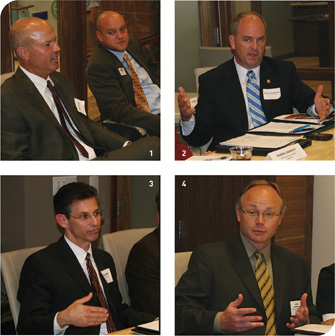
1: With Lyle Alexander listening in, John Dicus warns that things could get worse for banks. | 2. Politicians, said Paul Thompson, often try to pit bankers against consumers. | 3. Chuck Morris said bankers are waiting for regulations so they can react accordingly. | 4. Mike Hargrave wondered whether Dodd-Frank might provoke more litigation against banks.
“Can anybody dismantle a Goldman Sachs with offices in 140 countries?” asked Mike Lochmann. “I don’t care what plan you’ve got. That’s 140 different regimes, and I don’t think you’ll have an orderly unwind of an international institution of that size. Can’t be done.”
Chuck Morris, vice president of the Federal Reserve Bank of Kansas City, cautioned that interested parties will have to wait to see how the regulations are written, given that large organizations will likely face more stringent regulations. Until then, no one will know whether a bank can continue to operate profitably, “given the increased supervision they’re going to face.”
For John Dicus, that was part of the problem: “You’re putting it in the hands of bureaucrats, regulators, examiners to write these rules and regs based on what they interpret the legislation to say. I mean, it could get a lot worse than
it appears to be now. “
Compounding the problem, Karen Garrett added, is that regulators are supposed to have their regulations ready to apply within 12 months. “First of all, that isn’t going to happen,” said Garrett. “Secondly, if it did, it would be a nightmare, because there would be no time to do it in an orderly, intelligent fashion.”
Dicus cited an additional problem still, namely the FDIC’s effort “to work their way in” so that it would get a greater share of the regulatory bonanza.
“One of the things I’m concerned about,” said Paul Thompson, president and CEO of Country Club Bank, is our FDIC premiums in the future.” By increasing coverage limits, the FDIC will also be increasing the costs to the bank. “Sometimes bankers and the public are pitted against one another by politicians,” said Thompson, “and we’re made to look like we’re the bad guys.” This is unfortunate, he noted, because the public and the banks have shared goals. He worries, too, that the FDIC premiums that banks pay will be used to cover costs of social programs and other pet political projects.
A Level Playing Field?
Mike Lochmann asked his colleagues another one of the overarching questions that reform begs: Does Dodd-Frank level the playing field between banks and other financial service providers?
“Except for car dealers,” says Karen Garrett, “it should.” That does not mean it will. As Garrett explained, bank examiners are a constant presence in banks. Not so for mortgage brokers, which are regulated by states that may or may not do a very good job of it. Small loan lenders are typically examined by states as well, in some states better than others. “The rules may now apply to everybody,” said Garrett, “but whether they get enforced is a different story.”
Paul Thompson noted that if banks buy commercial paper from car dealers, they are still held liable for the dealers’ lending practices, even if the dealers are not. This has a disproportionate effect on the cost of doing business for the bankers. As a result, he said, “people are incented to go outside the protected regulated industry of the banking industry to these non-banks.”
Stinson partner Mark Hargrave added one more concern: the threat of private litigation. He wondered whether or not the regulations that CFPB promulgates will be written to encourage the plaintiffs’ bar. If so, then that, too, “will serve as another source of enforcement against the institutions that the FTC has primary jurisdiction over.”
“We now have invited every state attorney general and many state banking departments, for political reasons, to sue our banks,” said Lochmann. “That is ingrained in this, and I think we’re all naïve if we don’t think there aren’t going to be politicians that take advantage of that purely for political reasons.”
As Lochmann explained, there are any numbers of things an ambitious attorney general could sue for, like deceptive practices in credit cards or mortgage disclosure. “I think Ms. Warren is going to find a whole lot of things ‘unconscionable’ that we find normal.” He added, “It’s open season on banks, and that’s not a good thing.”